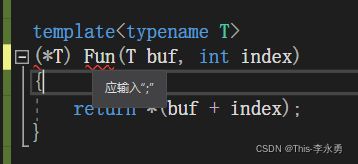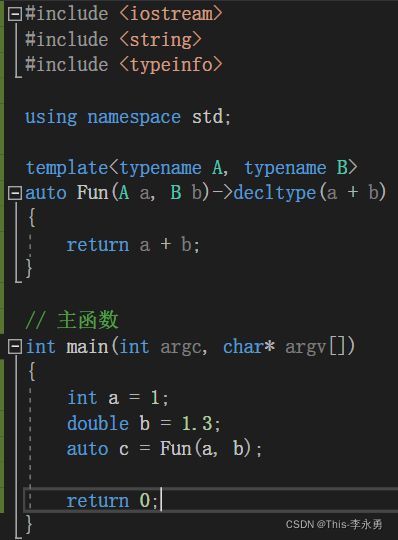前言这是一个重要的知识点,需要掌握。仔细体会代码。#include#include#includeusingnamespacestd;/*测试16进制表示*/intmain(){inta1=0xc0;coutbBin(b);coutCbin(c);intcnum=Cbin.to_ulong();cout<
centos7安装jumpserver堡垒机
落花_忆流年
运维项目linux
堡垒机简介跳板机属于内控堡垒机范畴,是一种用于单点登陆的主机应用系统。跳板机就是一台服务器,维护人员在维护过程中,首先要统一登录到这台服务器上,然后从这台服务器再登录到目标设备进行维护。但跳板机的缺点是没有实现对运维人员操作行为的控制和审计,出现误操作或违规操作难以定位到原因和责任人;并且跳板机存在严重的安全风险,如果跳板机系统被攻入,则后端资源完全暴露无遗。对于个别资源(如telnet)可以通过
ROS2 细节知识学习
儒雅芝士
ROS2系列机器人c++linux
1.rosidl_generate_interfaces()在ROS2中,rosidl_generate_interfaces是一个关键的构建工具功能。它主要用于从接口定义文件(如.msg消息文件、.srv服务文件和.action动作文件)生成不同编程语言(如C++、Python等)可以使用的接口代码。这些接口是ROS2中节点间通信的基础,确保了数据在不同组件之间能够准确、高效地传递。在构建系统中
C++实现链表
洗艾斯迪恩重度依赖
c++链表
1.单向静态链表constintN=10000;structnode{intid;intdata;intnextid;}nodes[N];nodes[0].nextid=1;//为next指针赋初值for(inti=1;i//定义链表listnode;//为链表赋值for(inti=1;i::iteratorit=node.begin();while(node.size()>1){it++;if(
分解质因数,求最大公约数和最小公倍数
2401_86161528
c++linux
3个c++程序分解质因数,求最大公约数和最小公倍数,方便数学计算1.分解质因数##includeusingnamespacestd;intmain(){while(1){longlongx,c=0,count=2;cout>x;cout=2){while((c!=0||countusingnamespacestd;longlonglcm(longlongx,longlongy);intmain()
MySQL与Oracle对比及区别
m0_74823434
面试学习路线阿里巴巴java
一、比较1、MySQL的特点性能卓越,服务稳定,很少出现异常宕机;开放源代码无版本制约,自主性及使用成本低;历史悠久,社区和用户非常活跃,遇到问题及时寻求帮助;软件体积小,安装使用简单且易于维护,维护成本低;品牌口碑效应;支持多种OS,提供多种API接口,支持多种开发语言,对流行的PHP,Java很好的支持2、Oracle的特点兼容性:Oracle产品采用标准SQL,并经过美国u构架标准技术所(N
基于 Node.js 的天气查询系统实现(附源码)
Kasper0121
node.js
项目概述这是一个基于Node.js的全栈应用,前端使用原生JavaScript和CSS,后端使用Express框架,通过调用第三方天气API实现天气数据的获取和展示。主要功能默认显示多个主要城市的天气信息支持城市天气搜索响应式布局设计深色主题界面优雅的加载动画技术栈后端:Node.js+Express前端:HTML5+CSS3+JavaScriptHTTP客户端:AxiosAPI:天气API(v1
python中@staticmethod方法
elie813
python基础
python中@staticmethod方法,类似于C++中的static,方便将外部函数集成到类体中,主要是可以在不实例化类的情况下直接访问该方法,如果你去掉staticmethod,在方法中加self也可以通过实例化访问方法也是可以集成。classTest:def__init__(self,num):self.num=num;defcout_num(self):print(self.num)@
C/C++教程 第十四章 —— MFC控件详解
余识-
C/C++实战入门到精通mfcc++c语言
注意本系列文章已升级、转移至我的自建站点中,本章原文为:MFC控件详解目录注意一、前言二、项目建立三、Comboxbox四、ListBox五、GroupBox六、Picturecontrol七、ScrollBar八、SpinControl九、ProgressControl十、hotkey十一、ListControl十二、TreeControl十三、TabControl一、前言通过前面两章的学习,现
C++——内存管理
kiiila
C++c++
目录1.c++内存分布2.c语言中动态内存管理3.c++动态内存管理4.operatornew和operatordelete函数5.new和delete的实现原理6.定位new表达式(了解)7.malloc/free和new/delete的区别8.什么是内存泄漏,内存泄漏的危害1.c++内存分布内核空间用户代码不能读写栈向下增长内存映射段文件映射、动态库、匿名映射堆向上增长数据段或静态区全局数据、
C++异常机制:构建健壮代码的艺术
Main. 24
c++开发语言
1.异常的概念及应用1.1.异常的概念异常处理机制允许程序中独⽴开发的部分能够在运⾏时就出现的问题进⾏通信并做出相应的处理,异常使得我们能够将问题的检测与解决问题的过程分开,程序的⼀部分负责检测问题的出现,然后解决问题的任务传递给程序的另⼀部分,检测环节⽆须知道问题的处理模块的所有细节。C语⾔主要通过错误码的形式处理错误,错误码本质就是对错误信息进⾏分类编号,拿到错误码以还要去查询错误信息,⽐较⿇
C++11:开启高效编程之旅(万字详解)
Main. 24
c++开发语言
1.列表初始化1.1.C++98传统的{}C++98中⼀般数组和结构体可以⽤{}进行初始化。structPoint{int_x;int_y;};intmain(){//初始化数组intarray1[]={1,2,3,4,5};intarray2[5]={0};//初始化结构体Pointp={1,2};return0;}1.2.C++11中的{}C++11以后想统⼀初始化⽅式,试图实现⼀切对象皆可⽤
Python知识点:如何使用Panda3D进行3D游戏开发
杰哥在此
Python系列python3d开发语言编程面试
使用Panda3D进行3D游戏开发是一个相对复杂但功能强大的过程。Panda3D是一个基于Python和C++的开源引擎,专为3D游戏开发而设计。它支持物理、动画、着色器、碰撞检测等,能够制作高质量的3D游戏。以下是如何使用Panda3D进行3D游戏开发的基本步骤。1.安装Panda3D首先,你需要安装Panda3D。你可以使用以下命令安装:pipinstallpanda3d2.创建一个基本的Pa
「Py」基础语法篇 之 Python缩进规则
何曾参静谧
「Py」Python程序设计数据库
✨博客主页何曾参静谧的博客(✅关注、点赞、⭐收藏、转发)全部专栏(专栏会有变化,以最新发布为准)「Win」Windows程序设计「IDE」集成开发环境「UG/NX」BlockUI集合「C/C++」C/C++程序设计「DSA」数据结构与算法「UG/NX」NX二次开发「QT」QT5程序设计「File」数据文件格式「UG/NX」NX定制开发「Py」Python程序设计「Math」探秘数学世界「PK」Pa
C++vector容器的使用
jax不摆烂
C++入门到精通c++开发语言
目录一、C++中什么是vector容器二、vector的特点三、使用场景四、对vector容器的简单使用1、vector构造函数2、vector赋值操作3、vector容量与元素个数4、vector的插入和删除5、vector数据的存取6、vector容器互换7、预留空间一、C++中什么是vector容器在C++中,vector是一个非常常用的标准模板库(STL)容器,它提供了动态数组的功能。ve
C++随笔记录:区别()和{}创建对象
jax不摆烂
C++入门到精通算法
C++在C++11之前的初始化方式五花八门,所以C++11引入统一初始化语法。初始化值要用圆括号()或者花括号{}括起来,或者放到等号=的右边:不管是基本类型、数组还是复杂容器,都可以用花括号{}来初始化;int x(0); //使用圆括号初始化int y= 0; //使用"="初始化int z{ 0 }; //使用花括号初始化 这里的=运算符可能会让人产生
命令模式 - 命令模式的设计思想
w(゚Д゚)w吓洗宝宝了
C++从0到1命令模式c++
引言在软件开发中,设计模式是解决常见问题的经典解决方案。命令模式(CommandPattern)是行为型设计模式之一,它将请求封装为对象,从而使你可以用不同的请求对客户进行参数化,并且支持请求的排队、记录日志以及撤销操作。本文将详细介绍命令模式的设计思想,并通过C++代码示例帮助读者深入理解。命令模式的定义命令模式的核心思想是将一个请求封装为一个对象,从而使你可以用不同的请求对客户进行参数化。命令
华为OD机试2024年E卷-分苹果[100分]( Java | Python3 | C++ | C语言 | JsNode | Go )实现100%通过率
梅花C
华为OD题库华为od
题目描述A、B两个人把苹果分为两堆,A希望按照他的计算规则等分苹果Q,他的计算规则是按照二进制加法计算,并且不计算进位12+5=9(1100+0101=9),B的计算规则是十进制加法,包括正常进位,B希望在满足A的情况下获取苹果重量最多。输入苹果的数量和每个苹果重量,输出满足A的情况下B获取的苹果总重量。如果无法满足A的要求,输出-1。数据范围1<=总苹果数量<=200001<=每个苹果重量<=1
【wiki知识库】05.分类管理模块--后端SpringBoot模块
熊哈哈O_o
从0到1带你搭建wiki知识库springboot后端javaspring
个人主页:哈__期待您的关注目录一、今日目标二、☀SpringBoot代码修改1.使用逆向工程生成Category表结构2.新增CategoryQueryParam3.新增CategorySaveParam4.新增CategotyQueryVo三、新增分类管理的相关接口1./category/all2./category/save3./category/delete1.我们删除的是一个二级分类2.
侯捷 C++ 课程学习笔记:开启 C++ 深度探索之旅
秃头小饼干
jvm开发语言c++
在C++的学习道路上,侯捷老师的课程宛如一座明亮的灯塔,为无数学习者照亮前行的方向。经过一段时间对侯捷C++课程的深入学习,我收获颇丰,在此将自己的学习笔记和感悟分享给大家,希望能对正在学习C++或者准备踏入C++领域的朋友们有所帮助。一、课程初印象初次接触侯捷老师的课程,就被其深入浅出的讲解风格所吸引。老师不仅有着深厚的技术功底,更具备出色的教学能力,能够将复杂的C++知识以通俗易懂的方式呈现出
ROS 实时修改动态参数的方法
jucat
ROS机器人自动驾驶linux
参考HokuyoLaser动态参数设置wikiipa覆盖算法源码背景工作中需要在C++程序运行过程中,根据场景开关costmap2d的障碍物感知图层以及膨胀图层。在yaml启动参数配置中加载障碍物层插件和膨胀层插件,但是关闭它们的更新,大概如下:global_costmap:global_frame:maprobot_base_frame:base_footprint...plugins:-{na
C++实现设计模式---职责链模式 (Chain of Responsibility)
计算机小混子
设计模式c++设计模式责任链模式
职责链模式(ChainofResponsibility)职责链模式是一种行为型设计模式,它允许多个对象都有机会处理请求,从而避免请求的发送者和接收者之间的耦合。这些对象通过形成一条链,沿着这条链传递请求,直到有对象处理它为止。意图通过将请求的发送者与接收者解耦,动态地决定由哪个对象来处理请求。使多个对象有机会处理请求,而不是由固定的对象处理。使用场景请求的处理者不确定:在运行时,可能需要多个对象来
华为OD机试E卷 --连续字母长度--24年OD统一考试(Java & JS & Python & C & C++)
飞码创造者
最新华为OD机试题库2024javapython华为odjavascriptc语言
文章目录题目描述输入描述输出描述用例题目解析JS算法源码Java算法源码python算法源码c算法源码c++算法源码题目描述给定一个字符串,只包含大写字母,求在包含同一字母的子串中,长度第k长的子串的长度,相同字母只取最长的那个子串。输入描述第一行有一个子串(1<长度<=100),只包含大写字母。第二行为k的值输出描述输出连续出现次数第k多的字母的次数。用例输入AAAAHHHBBCDHHHH3输出
Windows10环境下使用docker部署Dify
南南的sky
容器运维AIGC
前言最近带教导师让使用dify做一些工程项目,我在此之前没用过dify,也不知道怎么部署,便花了些时间研究了一下,这篇博客的主要目的是记录如何在windows10系统上使用docker部署dify,碰到了哪些问题以及解决方案。什么是DifyDify是一款开源的大语言模型(LLM)应用开发平台。它融合了后端即服务(BackendasService)和LLMOps的理念,使开发者可以快速搭建生产级的生
(c/c++)——C++和python的异常处理
想要躺平的一枚
C++pythonc语言c++
目录一、C++的异常处理二、python的异常处理——自定义异常一、C++的异常处理C++中选择用throw来抛出异常,catch来捕捉异常和处理try{//可能发生异常的语句//throw异常对象}catch(类型1){//发生类型1异常时的处理代码}catch(类型2){//发生类型2异常时的处理代码}catch(...){//不管什么异常,都在这里统一处理。}throw抛出异常对象,异常对象
redis学习笔记——不仅仅是存取数据
Everyday都不同
returnSourceexpire/delincr/lpush数据库分区redis
最近项目中用到比较多redis,感觉之前对它一直局限于get/set数据的层面。其实作为一个强大的NoSql数据库产品,如果好好利用它,会带来很多意想不到的效果。(因为我搞java,所以就从jedis的角度来补充一点东西吧。PS:不一定全,只是个人理解,不喜勿喷)
1、关于JedisPool.returnSource(Jedis jeids)
这个方法是从red
SQL性能优化-持续更新中。。。。。。
atongyeye
oraclesql
1 通过ROWID访问表--索引
你可以采用基于ROWID的访问方式情况,提高访问表的效率, , ROWID包含了表中记录的物理位置信息..ORACLE采用索引(INDEX)实现了数据和存放数据的物理位置(ROWID)之间的联系. 通常索引提供了快速访问ROWID的方法,因此那些基于索引列的查询就可以得到性能上的提高.
2 共享SQL语句--相同的sql放入缓存
3 选择最有效率的表
[JAVA语言]JAVA虚拟机对底层硬件的操控还不完善
comsci
JAVA虚拟机
如果我们用汇编语言编写一个直接读写CPU寄存器的代码段,然后利用这个代码段去控制被操作系统屏蔽的硬件资源,这对于JVM虚拟机显然是不合法的,对操作系统来讲,这样也是不合法的,但是如果是一个工程项目的确需要这样做,合同已经签了,我们又不能够这样做,怎么办呢? 那么一个精通汇编语言的那种X客,是否在这个时候就会发生某种至关重要的作用呢?
&n
lvs- real
男人50
LVS
#!/bin/bash
#
# Script to start LVS DR real server.
# description: LVS DR real server
#
#. /etc/rc.d/init.d/functions
VIP=10.10.6.252
host='/bin/hostname'
case "$1" in
sta
生成公钥和私钥
oloz
DSA安全加密
package com.msserver.core.util;
import java.security.KeyPair;
import java.security.PrivateKey;
import java.security.PublicKey;
import java.security.SecureRandom;
public class SecurityUtil {
UIView 中加入的cocos2d,背景透明
374016526
cocos2dglClearColor
要点是首先pixelFormat:kEAGLColorFormatRGBA8,必须有alpha层才能透明。然后view设置为透明glView.opaque = NO;[director setOpenGLView:glView];[self.viewController.view setBackgroundColor:[UIColor clearColor]];[self.viewControll
mysql常用命令
香水浓
mysql
连接数据库
mysql -u troy -ptroy
备份表
mysqldump -u troy -ptroy mm_database mm_user_tbl > user.sql
恢复表(与恢复数据库命令相同)
mysql -u troy -ptroy mm_database < user.sql
备份数据库
mysqldump -u troy -ptroy
我的架构经验系列文章 - 后端架构 - 系统层面
agevs
JavaScriptjquerycsshtml5
系统层面:
高可用性
所谓高可用性也就是通过避免单独故障加上快速故障转移实现一旦某台物理服务器出现故障能实现故障快速恢复。一般来说,可以采用两种方式,如果可以做业务可以做负载均衡则通过负载均衡实现集群,然后针对每一台服务器进行监控,一旦发生故障则从集群中移除;如果业务只能有单点入口那么可以通过实现Standby机加上虚拟IP机制,实现Active机在出现故障之后虚拟IP转移到Standby的快速
利用ant进行远程tomcat部署
aijuans
tomcat
在javaEE项目中,需要将工程部署到远程服务器上,如果部署的频率比较高,手动部署的方式就比较麻烦,可以利用Ant工具实现快捷的部署。这篇博文详细介绍了ant配置的步骤(http://www.cnblogs.com/GloriousOnion/archive/2012/12/18/2822817.html),但是在tomcat7以上不适用,需要修改配置,具体如下:
1.配置tomcat的用户角色
获取复利总收入
baalwolf
获取
public static void main(String args[]){
int money=200;
int year=1;
double rate=0.1;
&
eclipse.ini解释
BigBird2012
eclipse
大多数java开发者使用的都是eclipse,今天感兴趣去eclipse官网搜了一下eclipse.ini的配置,供大家参考,我会把关键的部分给大家用中文解释一下。还是推荐有问题不会直接搜谷歌,看官方文档,这样我们会知道问题的真面目是什么,对问题也有一个全面清晰的认识。
Overview
1、Eclipse.ini的作用
Eclipse startup is controlled by th
AngularJS实现分页功能
bijian1013
JavaScriptAngularJS分页
对于大多数web应用来说显示项目列表是一种很常见的任务。通常情况下,我们的数据会比较多,无法很好地显示在单个页面中。在这种情况下,我们需要把数据以页的方式来展示,同时带有转到上一页和下一页的功能。既然在整个应用中这是一种很常见的需求,那么把这一功能抽象成一个通用的、可复用的分页(Paginator)服务是很有意义的。
&nbs
[Maven学习笔记三]Maven archetype
bit1129
ArcheType
archetype的英文意思是原型,Maven archetype表示创建Maven模块的模版,比如创建web项目,创建Spring项目等等.
mvn archetype提供了一种命令行交互式创建Maven项目或者模块的方式,
mvn archetype
1.在LearnMaven-ch03目录下,执行命令mvn archetype:gener
【Java命令三】jps
bit1129
Java命令
jps很简单,用于显示当前运行的Java进程,也可以连接到远程服务器去查看
[hadoop@hadoop bin]$ jps -help
usage: jps [-help]
jps [-q] [-mlvV] [<hostid>]
Definitions:
<hostid>: <hostname>[:
ZABBIX2.2 2.4 等各版本之间的兼容性
ronin47
zabbix更新很快,从2009年到现在已经更新多个版本,为了使用更多zabbix的新特性,随之而来的便是升级版本,zabbix版本兼容性是必须优先考虑的一点 客户端AGENT兼容
zabbix1.x到zabbix2.x的所有agent都兼容zabbix server2.4:如果你升级zabbix server,客户端是可以不做任何改变,除非你想使用agent的一些新特性。 Zabbix代理(p
unity 3d还是cocos2dx哪个适合游戏?
brotherlamp
unity自学unity教程unity视频unity资料unity
unity 3d还是cocos2dx哪个适合游戏?
问:unity 3d还是cocos2dx哪个适合游戏?
答:首先目前来看unity视频教程因为是3d引擎,目前对2d支持并不完善,unity 3d 目前做2d普遍两种思路,一种是正交相机,3d画面2d视角,另一种是通过一些插件,动态创建mesh来绘制图形单元目前用的较多的是2d toolkit,ex2d,smooth moves,sm2,
百度笔试题:一个已经排序好的很大的数组,现在给它划分成m段,每段长度不定,段长最长为k,然后段内打乱顺序,请设计一个算法对其进行重新排序
bylijinnan
java算法面试百度招聘
import java.util.Arrays;
/**
* 最早是在陈利人老师的微博看到这道题:
* #面试题#An array with n elements which is K most sorted,就是每个element的初始位置和它最终的排序后的位置的距离不超过常数K
* 设计一个排序算法。It should be faster than O(n*lgn)。
获取checkbox复选框的值
chiangfai
checkbox
<title>CheckBox</title>
<script type = "text/javascript">
doGetVal: function doGetVal()
{
//var fruitName = document.getElementById("apple").value;//根据
MySQLdb用户指南
chenchao051
mysqldb
原网页被墙,放这里备用。 MySQLdb User's Guide
Contents
Introduction
Installation
_mysql
MySQL C API translation
MySQL C API function mapping
Some _mysql examples
MySQLdb
HIVE 窗口及分析函数
daizj
hive窗口函数分析函数
窗口函数应用场景:
(1)用于分区排序
(2)动态Group By
(3)Top N
(4)累计计算
(5)层次查询
一、分析函数
用于等级、百分点、n分片等。
函数 说明
RANK() &nbs
PHP ZipArchive 实现压缩解压Zip文件
dcj3sjt126com
PHPzip
PHP ZipArchive 是PHP自带的扩展类,可以轻松实现ZIP文件的压缩和解压,使用前首先要确保PHP ZIP 扩展已经开启,具体开启方法就不说了,不同的平台开启PHP扩增的方法网上都有,如有疑问欢迎交流。这里整理一下常用的示例供参考。
一、解压缩zip文件 01 02 03 04 05 06 07 08 09 10 11
精彩英语贺词
dcj3sjt126com
英语
I'm always here
我会一直在这里支持你
&nb
基于Java注解的Spring的IoC功能
e200702084
javaspringbeanIOCOffice
java模拟post请求
geeksun
java
一般API接收客户端(比如网页、APP或其他应用服务)的请求,但在测试时需要模拟来自外界的请求,经探索,使用HttpComponentshttpClient可模拟Post提交请求。 此处用HttpComponents的httpclient来完成使命。
import org.apache.http.HttpEntity ;
import org.apache.http.HttpRespon
Swift语法之 ---- ?和!区别
hongtoushizi
?swift!
转载自: http://blog.sina.com.cn/s/blog_71715bf80102ux3v.html
Swift语言使用var定义变量,但和别的语言不同,Swift里不会自动给变量赋初始值,也就是说变量不会有默认值,所以要求使用变量之前必须要对其初始化。如果在使用变量之前不进行初始化就会报错:
var stringValue : String
//
centos7安装jdk1.7
jisonami
jdkcentos
安装JDK1.7
步骤1、解压tar包在当前目录
[root@localhost usr]#tar -xzvf jdk-7u75-linux-x64.tar.gz
步骤2:配置环境变量
在etc/profile文件下添加
export JAVA_HOME=/usr/java/jdk1.7.0_75
export CLASSPATH=/usr/java/jdk1.7.0_75/lib
数据源架构模式之数据映射器
home198979
PHP架构数据映射器datamapper
前面分别介绍了数据源架构模式之表数据入口、数据源架构模式之行和数据入口数据源架构模式之活动记录,相较于这三种数据源架构模式,数据映射器显得更加“高大上”。
一、概念
数据映射器(Data Mapper):在保持对象和数据库(以及映射器本身)彼此独立的情况下,在二者之间移动数据的一个映射器层。概念永远都是抽象的,简单的说,数据映射器就是一个负责将数据映射到对象的类数据。
&nb
在Python中使用MYSQL
pda158
mysqlpython
缘由 近期在折腾一个小东西须要抓取网上的页面。然后进行解析。将结果放到
数据库中。 了解到
Python在这方面有优势,便选用之。 由于我有台
server上面安装有
mysql,自然使用之。在进行数据库的这个操作过程中遇到了不少问题,这里
记录一下,大家共勉。
python中mysql的调用
百度之后能够通过MySQLdb进行数据库操作。
单例模式
hxl1988_0311
java单例设计模式单件
package com.sosop.designpattern.singleton;
/*
* 单件模式:保证一个类必须只有一个实例,并提供全局的访问点
*
* 所以单例模式必须有私有的构造器,没有私有构造器根本不用谈单件
*
* 必须考虑到并发情况下创建了多个实例对象
* */
/**
* 虽然有锁,但是只在第一次创建对象的时候加锁,并发时不会存在效率
27种迹象显示你应该辞掉程序员的工作
vipshichg
工作
1、你仍然在等待老板在2010年答应的要提拔你的暗示。 2、你的上级近10年没有开发过任何代码。 3、老板假装懂你说的这些技术,但实际上他完全不知道你在说什么。 4、你干完的项目6个月后才部署到现场服务器上。 5、时不时的,老板在检查你刚刚完成的工作时,要求按新想法重新开发。 6、而最终这个软件只有12个用户。 7、时间全浪费在办公室政治中,而不是用在开发好的软件上。 8、部署前5分钟才开始测试。

